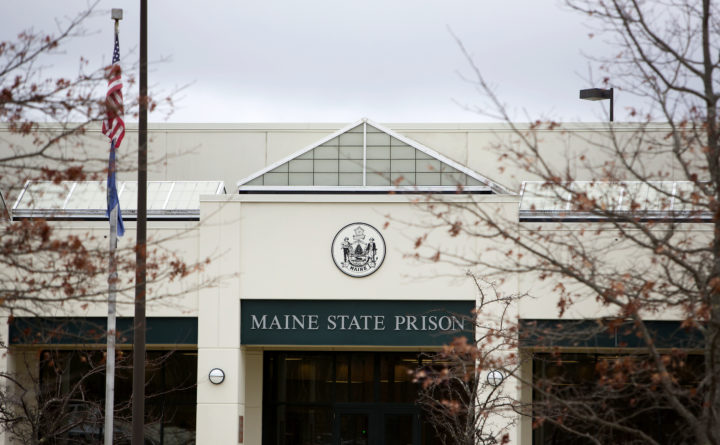WARREN, Maine — Seniority is a novelty at the Maine State Prison.
With 18 years under his belt, Maine State Prison corrections officer Chad Benner is the last officer from his hiring class left at the maximum security facility.
“It takes a special person to do this job,” Benner said. “Your biggest challenge is to stay positive in a negative environment.”
More than half of the officers at the state’s largest prison have been working there for less than five years, according to the prison’s new warden, Matthew Magnusson. Last year, 55 of the approximately 180 corrections officers working at the facility left. It’s a turnover rate that Magnusson said is on par with previous years.
The high turnover rate of corrections officers is not unique to the prison. Mental health and corrections officials say the day-to-day realities of the job — including the trauma to which they’re exposed — leads to a high burnout rate, and in some cases the development of post-traumatic stress disorder and other mental health disorders.
“It’s a very demanding job. I think a lot of people who haven’t worked inside a prison would have a hard time understanding some of the things that officers have to deal with on a daily basis, with some of the things they have to see,” Magnusson said.
Under the lead of a new commissioner, officials at the Maine State Prison have launched an initiative to focus on employee wellness, including a campaign to destigmatize mental health problems. Magnusson hopes by focusing on the needs of the staff currently at the facility, fewer officers will leave.
“We can hire all year long and at best we’re just going to break even,” Magnusson said. “The biggest thing, it’s not hiring, it’s retaining staff.”
The reality of the job
Corrections officers at the Maine State Prison are tasked with providing the security of about 1,000 inmates.
Officers work 12-hour shifts for three or four days per week. Depending on which inmate pod they are assigned to — which is determined by security level — officers work alone or with one other staff member in their pod.
Corrections officer James Hancox has worked at the prison for about 10 years. He too said it isn’t a job that everyone is cut out for, and he’s seen a lot of officers come and go.
“We work really long hours, whether we choose to or because we have to due to [short] staffing. It’s a tough job physically and mentally,” Hancox said. “Mentally, you’re trying to stay on top of your game all day.”
Benner equated the role of a corrections officer to that of a lifeline for inmates. Officers handle all types of business for their inmate pod, including food service, cleanliness and medication service, as well as handling people who are in crisis, people who are working on getting better and some who are being deceitful, he said.
Dealing with the variations in behavior among the inmate population is one reason, Hancox said, officers leave the prison.
While there are some inmates “that you would have over for dinner,” Benner said, there are other inmates that you would not want to be around if you had the choice.
“Nevertheless, you have to be around both of those types of people, and you have to be professional,” he said.
Maintaining that professionalism can be hard in some instances, Hancox said. One of the worst things to deal with, he said, is having some type of bodily fluid thrown on you. He’s had inmates try to throw cups of urine at him, and though he hasn’t been hit squarely, other officers haven’t been so lucky.
“People have taken a full cup of feces in the face or in the mouth, and it’s really hard to maintain your composure,” Hancox said.
Among the most difficult days on the job, the officers said, are when inmates are found abusing themselves or when they assault other inmates or staff.
“If I am assaulted by a prisoner that is incarcerated here, the next day or the next week, I’m going to have to serve that prisoner a hot and a cold meal. If the hot meal isn’t quite hot enough, I have to take it back and bring a new one,” Benner said. “To have a professional outlook when you do that, that’s extremely difficult for people to do.”
Not being able to avoid the place where a traumatic event occurred is one of the biggest contributing factors to experiencing symptoms of post-traumatic stress disorder (PTSD), according to Kelly Scanlon, a social worker at McLean Hospital.
Across the country, about 30 percent of corrections officers suffer from PTSD, more than four times the national average in other occupations, according to a 2013 study by a nonprofit group looking at the wellbeing of corrections officials.
The same study found that the suicide rate among corrections officers is about 40 percent higher than people in all other occupations.
“Corrections employees, they learn to live two lives. The life inside the prison and on the other side of the wall,” Scanlon said.
The problems of being short-staffed
When officers decide they’ve had enough of the job, the vacant position they leave behind causes a trickle down effect that affects staff and inmates.
Currently, there are about 17 vacant corrections officer positions at the prison. While there is an incoming class of 10 corrections officers, they’re still finishing their academy and on-the-job training, so they are not currently providing coverage, Magnusson said.
To make up for vacancies, the first step is to move around officers, whether it be taking an officer from the mailroom or from the front gate, and moving them to a post inside inmate pods.
The next step is modifying inmates’ activity schedules. This can mean keeping inmates in their housing unit for activities instead of going to the designated activities building. In some cases, short staffing can also lead to the cancellation of education classes and other programming, Magnusson said.
“Those are all things we don’t want to do because the main goal of the department is to reduce recidivism upon release, and by taking away education classes and programming, then we’re not accomplishing our goal,” Magnusson said. “However, at the same time, we can only do that if we have the staff to support it.”
Mandated overtime for officers is the last resort shift commanders at the prison will take. Typically, this happens only when the prison is not fully staffed and officers call out sick or are on vacation, Magnusson said.
Through mandated overtime, officers are required to stay on an extra three hours after their 12-hour shift has ended. It’s something Magnusson said will “absolutely increase turnover” among officers.
“Fifteen hours, especially when you’re coming back to do another shift [the next day], it’s tough. We know that leads to burnout,” Magnusson said.
The Maine State Prison is always hiring for corrections officers, but there are barriers to recruiting officers. Geography is one.
With the prison located in rural midcoast Maine, local hiring options are limited. “There aren’t a lot of people in this area that haven’t worked at the prison or know someone who works at the prison,” Magnusson said.
To expand the radius from which the prison can hire, housing for corrections officer is offered at the old warden’s house in Thomaston. Magnusson said officers who travel one or two hours to get to work often stay at the house for the days they work and then head back home for their string of off days.
While the prison constantly needs officers, Magnusson said they need to be sure they’re hiring people who will be able to handle the authority that’s given to them.
“We have 1,000 inmates, and we have to maintain order. But at the same time, we have to do it in a respectful manner,” Magnusson said. “We have to be able to trust our officers to use the authority that is given to them but use it in the way that it is intended to be used.”
Breaking down the stigma
With a turnover rate of about 50 officers per year, constantly having to hire and train corrections officers is taxing on the Department of Corrections, Magnusson said.
Under new Corrections Commissioner Randall Liberty, who was the former Maine State Prison warden, Magnusson said employee wellness and mental health awareness has become an important objective and one way the prison is hoping to retain staff.
Last month, the Maine State Prison partnered with McLean Hospital to begin a deconstructing stigma campaign, which started a dialogue at the prison about mental health awareness. Two seminars were held March 5 and 7, led by McLean Hospital staff, including Scanlon, which educated staff on the signs of mental health disorders, such as PTSD.
Through this campaign, several members of the prison’s staff, including Liberty, have made posters that shared their mental health struggles. Liberty has always been open about his own PTSD, Magnusson said. These posters now greet officers walking into work every day.
“I think this is so important because in the culture of corrections, there is a sense that vulnerability and weakness should not be displayed, and a mental health diagnosis carries a stigma,” Scanlon said. “If it’s not talked about and not accepted, then the staff suffers alone and truly worries about losing their job and being unfit for duty.”
Maintaining a stress management and wellness routine is key to being able to balance the stressors of the job with normal everyday life, Benner and Hancox said. However, they both said they handle their stress and personal traumas in their own way — and it typically doesn’t mean talking about it.
But they agree that being able to acknowledge that people suffer mentally while doing the job is important to feeling supported.
“I think it is helpful in a lot of ways to take the stigma out of being a normal person exposed to an abnormal situation,” Benner said. “It’s really important to understand that you’re a normal person but you’ve been exposed to an abnormal situation or experience, so it’s going to be natural for you to have certain feelings and feel certain ways.”
Through the focus on employee wellness, the prison will also be expanding a peer support group that has existed for years. Benner has been a part of the group for several years, and he’s glad the group will be receiving more support and training. Being able to help his people is the main reason he’s stayed on the job for as long as he has, while so many officers have left.
“I’ve stayed because I love my job,” Benner said. “I love my job because I’m at a place where I know I can make a difference every day.”
This article originally appeared on www.bangordailynews.com.








